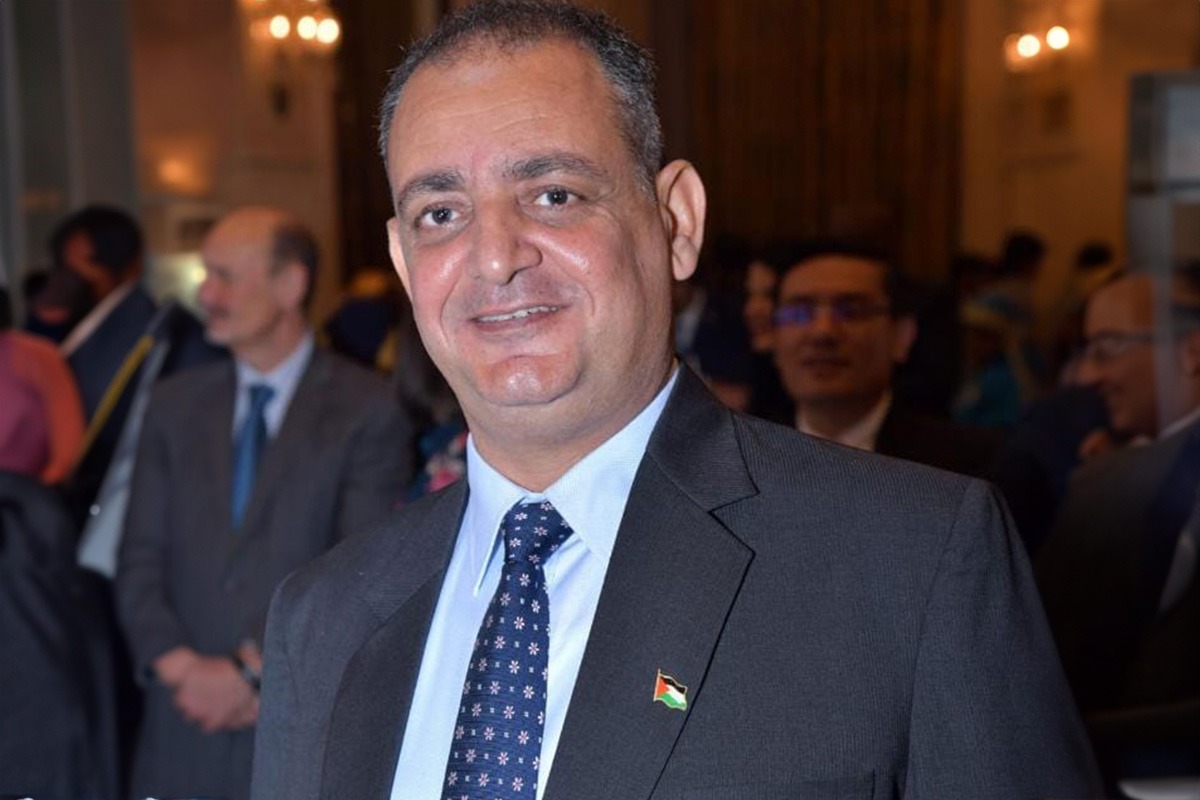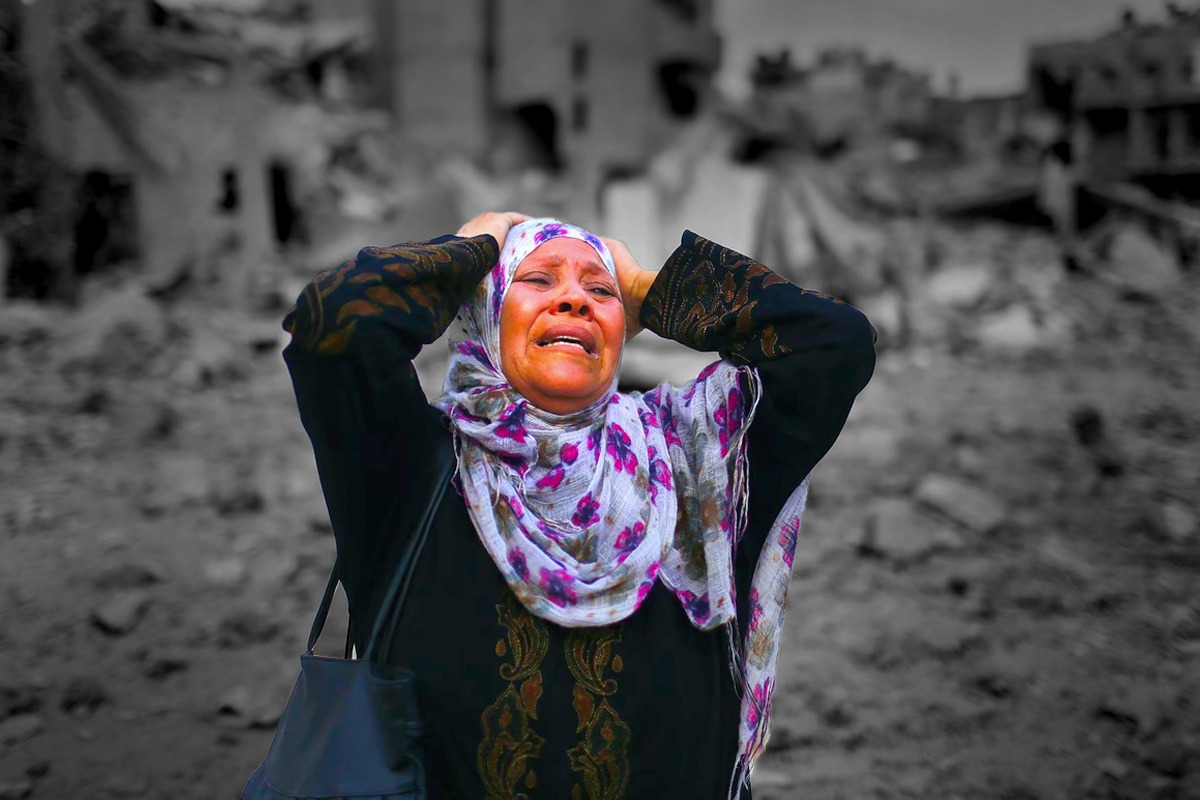NEW DELHI: On October 7, Hamas militants initiated an unprecedented attack on Israel from the Gaza Strip, resulting in approximately 1,400 casualties and over 200 hostages, according to Israeli Prime Minister Benjamin Netanyahu. In response, Israel conducted airstrikes on Gaza and launched a ground offensive. As per the Hamas-run health ministry, the current death toll in Gaza has surpassed 10,000.
As tensions rise and concerns about a broader conflict escalate, in an exclusive interview with The New Indian, Abed Elrazeg Abu Jazer, Media Advisor at the Palestinian Embassy in Delhi, delved into various topics, including Hamas’ October 7 assault on Israel, the Gaza siege, the alleged construction of 500 kilometres of tunnels by Hamas, Palestinian President Abu Mazen’s visit to Gaza, and the urgent need to return to an authentic peace process, emphasising the implementation of UN resolutions on the ground.

Q: How did Hamas’ actions, on October 7, benefit the Palestinians, and is it accurate to call these actions “resistance”?
Abed: “This operation represents the fifth in a series of conflicts, starting from 2008, with a continuous cycle of wars due to the ongoing peace process established in 1991. Despite numerous civil agreements and signing with Israel, there has been no implementation on the ground. President Mahmoud Abbas, leading Palestine, the Palestinian Authority, and the PLO since 2005, has seen a stagnant peace process for 23 years after the death of former President Yasser Arafat.
“Israel has not fulfilled any commitments outlined in these agreements, contributing to a dangerous situation and creating a breeding ground for clashes. The people in Gaza live in a physically gated community under siege, with limited access and control exerted by Israel, leading to economic hardship and no hope for the new generation. Strict restrictions on travel, exploration, and the entry of essential materials further exacerbate the challenging conditions, making the region prone to conflict.”
Q: So, if everything has been under the control of Israel in the Gaza Strip, how does Hamas manage to continuously replenish its stockpile of rockets?
Abed: “We cannot discuss Hamas. They are not included in the PLO (Palestine Liberation Organization). Rather than discussing political parties or groups, we must discuss the suffering of my people under Israeli occupation. Let’s focus on the challenges, the Israeli attitude towards us, the peace process, ongoing Israeli aggression, and collaborate to halt this aggression and advocate for a ceasefire. The closure of the area affects not only Palestinians but all residents in the Middle East, posing a threat to global stability and peace.
Also Read: EXCLUSIVE | Israel-Palestine struggling in the clutches of unseen environmental crisis: NWF VP
“The current crisis has diverted attention from the Ukraine-Russia conflict to the Middle East. The US has been inactive in promoting peace in the region, neglecting its responsibility as guarantors of the signed peace process. They haven’t proposed initiatives for the two-state solution agreed upon in 1967, leaving the area in turmoil for over two decades. The absence of peace initiatives jeopardises the well-being and stability of everyone in the region, impacting daily life and sending a negative message to the new generation.”
Q: If there was a siege on Gaza, how was there access to enough cement to construct 500 kilometres of tunnels?
Abed: “It’s often Israeli propaganda. Speaking as someone from Gaza for the past 30 years, I’ve never personally seen any of these tunnels or the alleged military infrastructure. There might be local structures, but these are used by civilians leading normal lives in the Gaza Strip, given the challenging circumstances and siege they face. Israel, at times, exploits this narrative to portray Gazans as having military capabilities comparable to Israeli soldiers.
“However, it’s mostly local in nature. The intention is to create a perception of Palestinians being a threat, justifying military actions. Despite global awareness of Israel’s technological prowess, they often leverage a higher narrative to emphasise the danger posed by Palestinian civilians.
“If you study the statistics of Palestinian casualties, approximately 60-65 per cent are civilians, including around 4,500 children and 1,500-1,700 women. Numerous families have already been declared casualties in civilian records. The use of advanced technology like F-16 or F-15 to demolish buildings is evident to the world through various news channels. It’s not just my perspective as a Palestinian; the world witnesses the reality of these events.”
Q: Considering you mentioned the broader impact on the entire Middle Eastern region, what is your perspective on Lebanon recently declaring its support for Palestine in the ongoing conflict?
Abed: “See, I cannot specifically discuss a particular country. The global freedom movement, along with its alliances and rallies, has gained widespread support worldwide. The most recent rally in Washington and London has been the largest, with a significant presence of protestors. In Washington, a sizable rally has been ongoing for the past three to four days, urging the Biden administration to intervene and bring an end to the intense conflict in Gaza. A similar rally is taking place in London.
“This movement is not limited to a specific age group or nationality; people of various backgrounds globally are advocating for peace, calling for an end to Israeli aggression, and advocating for a return to normal life for all generations. The essence of this protest is to convey these messages, urging the Biden administration and America to swiftly intervene. It transcends national boundaries, and as an official, I want to highlight that the recent General Assembly resolution, supported by 120 countries, aims to halt the killing of Palestinian civilians. However, America has not yet provided substantial support or called for a ceasefire on the ground.”
Q: Why does a PLO representative, who witnessed Hamas throwing colleagues off roofs in 2006, continue to defend Hamas actions?
Abed: “We, as representatives of the Embassy of Palestine, operate under the umbrella of the PLO and the Palestinian Authority. These entities were established through the Oslo Agreement, a pact signed with Israel in the White House after 1993. The Palestinian people are represented by the PLO and the Palestinian Authority, acknowledged as a UN General Assembly member with missions globally and an independent foreign policy. They have engaged in negotiations with Israel since the Madrid Conference in 1991, and we serve as representatives in India among other countries.”
Q: When was the last time the president of the Palestinian Authority, Mr. Abu Mazen, visited the Gaza Strip?
Abed: “President Abbas has wanted to visit Gaza for a long time, and has also announced it multiple times. It is hoped, Inshallah, after the current conflict, he will be able to make this visit. As you may be aware, the main offices of the authority were relocated to Ramallah after the passing of Yasser Arafat. Despite his election in 2006, which took place in both Gaza and the West Bank, President Abbas has consistently expressed his belief in a political solution for Gaza.
“He conveyed this perspective to Blinken (US Secretary of State Antony Blinken) in their recent meeting and reiterated on November 8. Emphasising that there is no security solution for Gaza, President Abbas reaffirms that Gaza is an integral part of the Palestinian Authority. This stance is shared by the entire Arab world, which rejects an isolated solution for Gaza. The collective position advocates a return to the authentic peace process, urging the implementation of UN resolutions on the ground. The vision is for a single state with two parts, and East Jerusalem is recognised as a heritage in this framework.”

